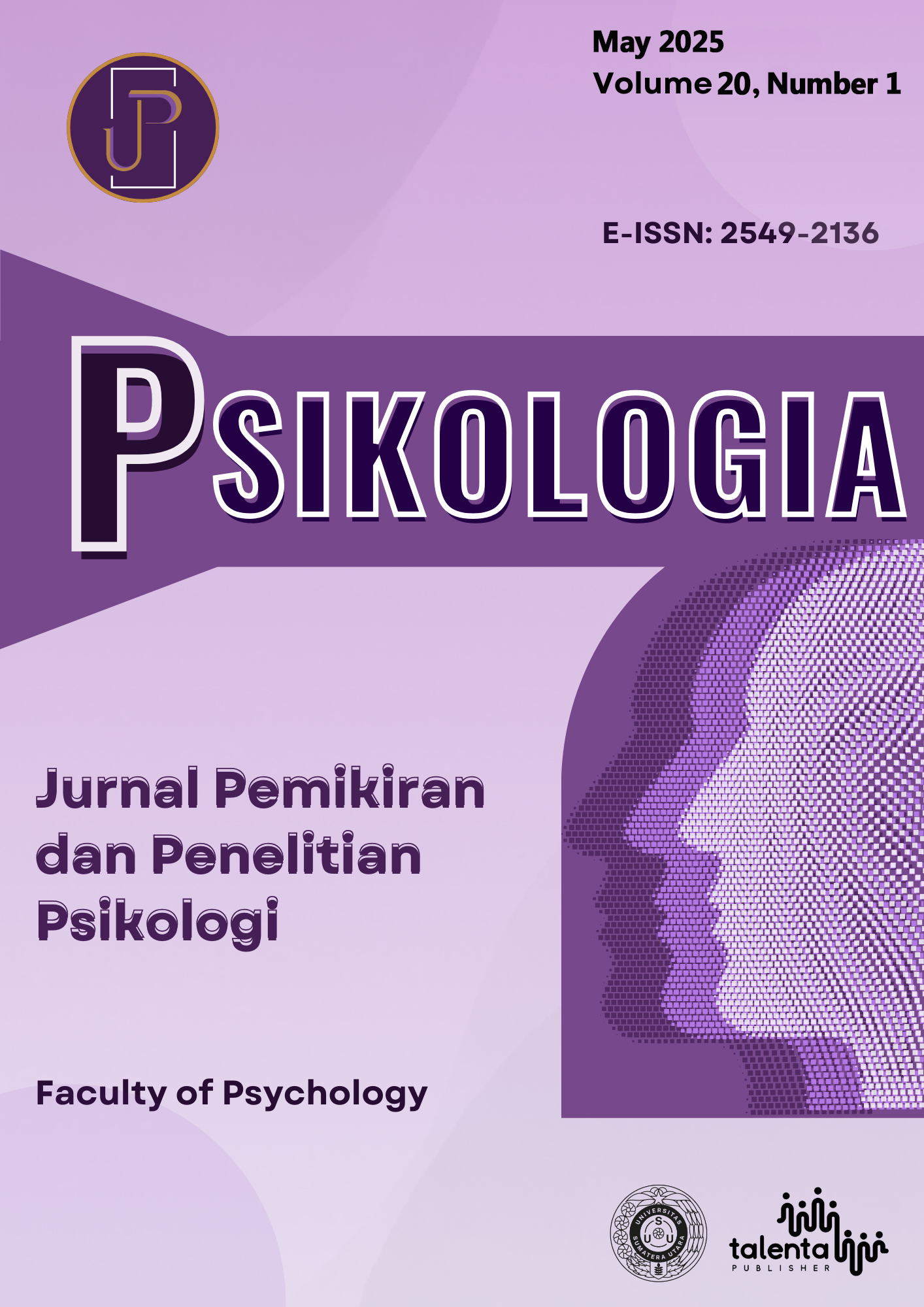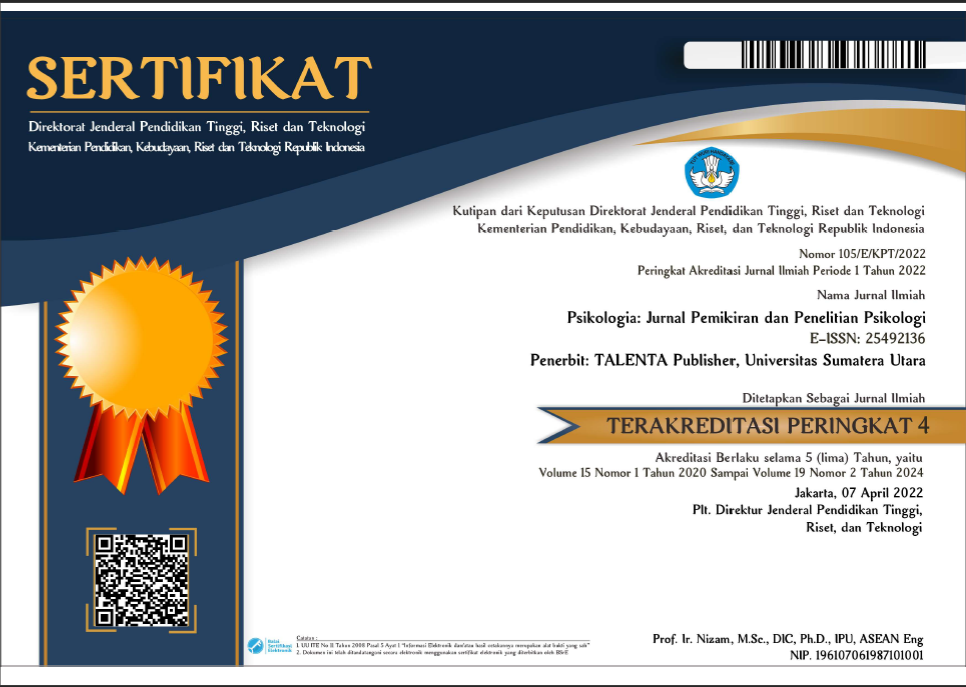Factors affecting psychological well-being of college students in the solo raya region: The influence of helicopter parenting and fear of negative evaluation
DOI:
https://doi.org/10.32734/psikologia.v20i1.18647Keywords:
fear of negative evaluation, helicopter parenting, psychological well-beingAbstract
Students have many tasks that indirectly require support from their surroundings to survive and have good psychological well-being. Students with good psychological conditions can learn how to adapt and fully carry out lectures. Often, students have problems such as stress, depression, and anxiety disorders that affect their psychological well-being. This study aimed to examine the relationship between helicopter parenting and fear of negative evaluation on students' psychological well-being. This study used a quantitative correlational method with 366 students in Solo Raya. This study used the Helicopter Parenting scale, the Fear of Negative Evaluation scale, and the psychological well-being scale. The data analysis used is multiple regression analysis, showing a significant relationship between Helicopter Parenting and Fear of Negative Evaluation with the Psychological Well-Being of Greater Solo students (F = 201.490, p <0.01). It was also found that there is a negative relationship between Helicopter Parenting and Psychological Well-Being of Greater Solo students (r = -.495; p < 0.01) and a negative relationship between Fear of Negative Evaluation and Psychological Well-Being of Greater Solo students. Students' level of psychological well-being in this study is classified as moderate, so it is necessary to reduce Helicopter Parenting and Fear of Negative Evaluation by improving communication patterns with parents and fostering self-confidence in individuals to manage negative criticism from the surrounding environment.
References
Auliya, Z. (2023). Gambaran Tingkat Helicopter Parenting Yang Dialami Remaja Di Sma Negeri Sekitar Semarang Timur. 9(1), 39–44.
Bagja S, W., & Supriyadi, D. (2018). Pengaruh Kemampuan Pedagogik Guru Dengan Hasil Belajar Ips. Jurnal Ilmiah Edutecno, 18(2), 1–19.
Botkin, T. N., Makol, B. A., Racz, S. J., & De Los Reyes, A. (2021). Multi-Informant Assessments of Adolescents’ Fears of Negative and Positive Evaluation: Criterion and Incremental Validity in Relation to Observed Behavior. Journal of Psychopathology and Behavioral Assessment, 43(1), 58–69. https://doi.org/10.1007/s10862-020-09855-y
Carr, V. M., Francis, A. P., & Wieth, M. B. (2021). The Relationship Between Helicopter Parenting and Fear of Negative Evaluation in College Students. Journal of Child and Family Studies, 30(8), 1910–1919. https://doi.org/10.1007/s10826-021-01999-z
Dewi, A. D., & Purwandari, E. (2024). Keharmonisan Keluarga, Integrasi Sosial, Lokus Kendali, Dan Kesejahteraan Psikologis Anak Yang Berhadapan Dengan Hukum. Jurnal Ilmu Keluarga Dan Konsumen, 17(1), 90–102. https://doi.org/10.24156/jikk.2024.17.1.90
Dodd, R. H., Dadaczynski, K., Okan, O., McCaffery, K. J., & Pickles, K. (2021). Psychological wellbeing and academic experience of university students in australia during covid-19. International Journal of Environmental Research and Public Health, 18(3), 1–12. https://doi.org/10.3390/ijerph18030866
Fitria, N., & Arifudin, O. (2020). ANALISIS FAKTOR-FAKTOR TERHADAP PENGAMBILAN. 1(2), 120–127.
Geukens, F., Maes, M., Spithoven, A., Pouwels, J. L., Danneel, S., Cillessen, A. H. N., van den Berg, Y. H. M., & Goossens, L. (2022). Changes in adolescent loneliness and concomitant changes in fear of negative evaluation and self-esteem. International Journal of Behavioral Development, 46(1), 10–17. https://doi.org/10.1177/0165025420958194
Hasna, A. N., & Karyani, U. (2023). Hubungan Dukungan Teman Sebaya dan Kebersyukuran terhadap Resiliensi Akademik Mahasiswa Fakultas Psikologi Universitas Muhammadiyah Surakarta (Dctoral dissertation, Universitas Muhammaiyah Surakarta).
Hidayati, B. M. R., & Fadhilah, T. N. (2021). Religiusitas dan Kesejahteraan Psikologis Mahasiswa Fakultas Dakwah. Indonesian Journal of Humanities and Social Sciences, 2(3), 197–210. https://doi.org/10.33367/ijhass.v2i3.2276
Kan, J. V., Sugoto, S., & Elisabeth, M., P., (2020). Peran Helicopter Parenting dalam Meningkatkan Self Efficacy Mahasiswa Universitas Surabaya. Temilnas XII, 1–7.
Kouros, C. D., Pruitt, M. M., Ekas, N. V., Kiriaki, R., & Sunderland, M. (2017). Helicopter Parenting, Autonomy Support, and College Students’ Mental Health and Well-being: The Moderating Role of Sex and Ethnicity. Journal of Child and Family Studies, 26(3), 939–949. https://doi.org/10.1007/s10826-016-0614-3
Lei, J., & Russell, A. (2021). I Have a Fear of Negative Evaluation, Get Me Out of Here! Examining Latent Constructs of Social Anxiety and Autistic Traits in Neurotypical and Autistic Young People. Journal of Autism and Developmental Disorders, 51(5), 1729–1747. https://doi.org/10.1007/s10803-020-04657-3
Li, Z. S., & Hasson, F. (2020). Resilience, stress, and psychological well-being in nursing students: A systematic review. Nurse Education Today, 90, 104440. https://doi.org/10.1016/j.nedt.2020.104440
Londo, E. E., & Sumendap, R. F. (2022). Helicopter parenting: studi kasus konseling pastoral dalam menangani pola asuh helikopter. POIMEN Jurnal Pastoral Konseling, 3(2), 68–84.
Mark R.Leary. (1983). A Brief Version of the Fear of Negative Evaluation Scale. In Personality and Social Psychology Bulletin (Vol. 9, Issue 3, pp. 371–375).
Nie, T., Cai, M., & Chen, Y. (2023). An Investigation of Helicopter Parenting and Interpersonal Conflict in a Competitive College Climate. Healthcare (Switzerland), 11(10). https://doi.org/10.3390/healthcare11101484
Nurlina, N. (2019). Peran Orang Tua dalam Pembentukan Kepribadian Anak di Era Digital. An-Nisa, 12(1), 549–559. https://doi.org/10.30863/annisa.v12i1.453
Odenweller, K. G., Booth-Butterfield, M., & Weber, K. (2014). Investigating Helicopter Parenting, Family Environments, and Relational Outcomes for Millennials. Communication Studies, 65(4), 407–425. https://doi.org/10.1080/10510974.2013.811434
Oktavia, L. (2021). Hubungan Dukungan Sosial Dengan Kesejahteraan Psikologis Pada Mahasiswa Di Masa Pandemi Covid-19. Naskah Publikasi, 6–20. http://eprints.ums.ac.id/id/eprint/92881
Okvellia, C. T. H., Setyandari, A. (2022). Resiliensi Akademik Mahasiswa TingkatAkhir Program Studi Bimbingan dan Konseling Tahun Ajaran 2021/2022. Solution: Jurnal of Counseling and Personal Development, 4(2), 18-24.
Papalia, D. E., & Fieldman, R. D. (2017). Menyelami Perkembangan Manusia (Rahmawati (ed.)). Salemba Humanika.
Pertiwi, E. M., Dewi R. S., Rahkman A. (2022). Psychological Well-being among Gen Z Social Media Users. Jurnal Ilmiah Psikologi, 7(3), 204–218
Pratiwi, I. A., & Hertinjung, W. S. (2023). Peran Self-esteem dan Keharmonisan Keluarga bagi Kesehatan Mental Mahasiswa Universitas Muhammadiyah Surakarta. Jurnal Psikologi, 19(1), 14-22. http://dx.doi.org/10.24014/jp.v19i1.18760
Putera, K. D., Yuniardi, M. S., & Masturah, A. N. (2020). Apa Saya Khawatir Karena Fear of Negative Evaluation? Sebuah Studi Pada Remaja. Mediapsi, 6(1), 17–25. https://doi.org/10.21776/ub.mps.2020.006.01.3
Rahmawati, S., Prihartanti, N., & Purwandari, E. (2022). Parenting in the bapukung tradition. Indigenous: Jurnal Ilmiah Psikologi, 7(2), 189–203. https://doi.org/10.23917/indigenous.v7i2.18090
Ratnasari, D., & Pribadi, H. (2019). Hubungan Antara Dukungan Sosial Terhadap Penerimaan Diri Siswa Kelas Viii Smp Negeri 3 Tarakan. Jurnal Bimbingan Dan Konseling Borneo, 1(2), 14–18. https://doi.org/10.35334/jbkb.v1i2.1159
Ryff, C. D. (2013). Psychological well-being revisited: Advances in the science and practice of eudaimonia. Psychotherapy and Psychosomatics, 83(1), 10–28. https://doi.org/10.1159/000353263
Sari, J., & Yuniasanti, R. (2023). The correlation between experienced workplace incivility with the psychological well-being of employees Hubungan antara experienced workplace incivility dengan kesejahteraan psikologis pada karyawan. Jurnal Pemikiran Dan Penelitian Psikologi, 18(1), 2023.
Sayyidah, A. F., Mardhotillah, R. N., Sabila, N. A., & Rejeki, S. (2022). Peran Religiusitas Islam dalam Meningkatkan Kesejahteraan Psikologis. Al-Qalb : Jurnal Psikologi Islam, 13(2), 103–115. https://doi.org/10.15548/alqalb.v13i2.4274
Schiffrin, H. H., Yost, J. C., Power, V., Saldanha, E. R., & Sendrick, E. (2019). Examining the Relationship between Helicopter Parenting and Emerging Adults’ Mindsets Using the Consolidated Helicopter Parenting Scale. Journal of Child and Family Studies, 28(5), 1207–1219. https://doi.org/10.1007/s10826-019-01360-5
Seki, T. (2023). The Mediating Role of Perfectionism and the Need for Social Approval in the Effect of Helicopter Parenting on Psychological Well-Being in Emerging Adults. International Journal of Educational Research Review, 8(2), 343–353. https://doi.org/10.24331/ijere.1255279
Sugiyono, P. D. (2017). Metode Penelitian. Bandung: Penerbit Alfabeta.
Sujadi, N. S., & Wijayanti, A. C. (2019). Perbedaan Pengetahuan, Sikap, Dukungan Teman Sebaya dan Perilaku Sadari paa Mahasiswa i Universitas Muhammadiyah Surakarta. Jurnal Kesehatan, 12(2), 9767.
Suryanto, A., & Nada, S. (2021). Analisis Kesehatan Mental Mahasiswa Perguruan Tinggi Pada Awal Terjangkitnya Covid-19 di Indonesia. Jurnal Citizenship Virtues, 1(2), 83–97.
Downloads
Published
Issue
Section
License
Copyright (c) 2025 Esa Sapna Pinasti & Wisnu Sri Hertinjung

This work is licensed under a Creative Commons Attribution-ShareAlike 4.0 International License.









